Divinity: Original Sin 2's narrative is fuelled by dizzying, twisted multiplayer
Straight from the Source.
Divinity: Original Sin 2 is an RPG heretic. It wants you to split the party. It wants you to work against each other. It'll even force your hand, as our team of four mismatched heroes discovered when trying to get into town. Party leader Gwynne got a warm enough welcome, at least as warm as a prodigal daughter last seen being arrested as a corrupt sorceress can expect. Her dwarf companion had no such luck though, being rudely and immediately turned away at the gates by the racist guard. For him, the only way in was to find an alternate route, through a series of caves far from the gates and far from his so-called friends. All of them already questing without him.
At which point he was handed a task of his own: assassinate Gwynne. Her brother had no interest in his sister reclaiming her birthright, and he was willing to pay to get rid of her.
Hmm. Decisions, decisions. Specifically, use a lightning bolt, or an arrow?
Divinity: Original Sin 2, due to hit Kickstarter any minute now if it hasn't already, is already shaping up to be a fascinating game, not least for drawing as much inspiration from the likes of Spy vs. Spy as its predecessor did from Ultima 7. On the surface, yes, it looks familiar. Under the graphics though it's a huge leap forwards, both for the series and Larian's new approach of building games around multiplayer systems instead of having the world revolve around a single player.
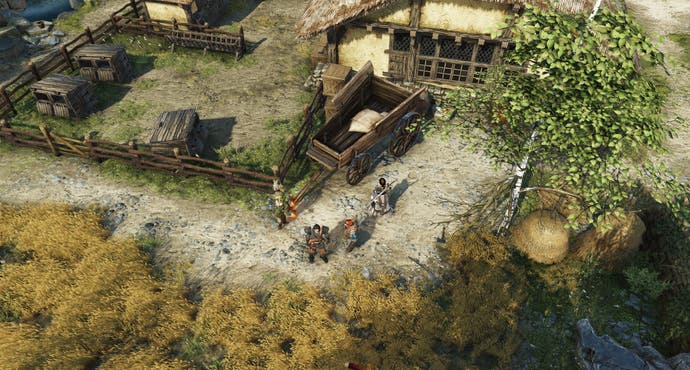
Now, as before, that doesn't mean you have to play it socially, though you can - up to three players this time, either with one character each or sharing out the party as you see fit. Larian is well aware that only around 10-15 per cent of players teamed up last time (their numbers) and the focus is still very much on the single-player experience. The advantage of designing for multiplayer anyway though is that it forces systems and scripts to be more reactive and open and bulletproofed, with the result that you get a far more responsive, weighted world. An NPC can't simply teleport out of jail behind a fade-to-black once found innocent for instance. A quest has to work whether or not one player knows what's coming, or finds a key character dead on arrival.
The implementation of this in Original Sin was a good start, but it wasn't hard to see the limits and the ways that Larian kept its chaos more or less under control. As well as the path through the game being heavily constrained by enemy levels, its approach to anything-goes questing tended to boil down to very simple raw design, and NPCs leaving a lot of very convenient notes near to their corpses to point psychotic players in the next direction. This time, Larian is shooting higher, with far more focus on both emergent systems and player freedom to experiment and subvert things for whatever reason. Town guards for instance will get more suspicious as things go wrong rather than simply switching into search and destroy mode at the slightest provocation. If you're holding contraband goods, no problem. If you've raised suspicion enough for random searches, problem. If another player has quietly let them know that you're worth searching, intrigue!
At its core, the idea is that a party should be a collection of individuals with their own stories, their own opinions and their own opportunities that may or may not mesh with what everyone else wants. Often, goals will be secret, unless you choose to share that your character is, say, a member of a brotherhood of assassins, or your family vault contains vast amount of treasure that you aren't confident you can get to alone. After all, why should you share your birthright?
This is 'competitive questing' - not just PVP, but players racing to solve problems around town to get the reward, chasing unique rewards, finding alternate routes that only they can, like working with smugglers to get aboard a boat or persuading a local lord to give you a ride on his dragon. Eventually the team will come together again, but in these moments you can be out on your own.
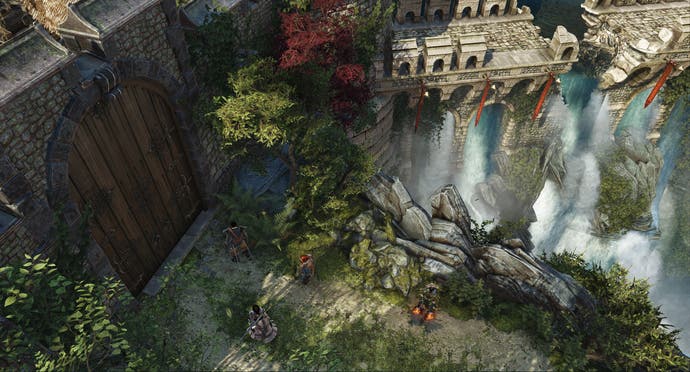
Examples. In the demo town, the big story revolved around a poisoning - two suspects, one dwarf, one human. Neither suspect will talk to the wrong kind of person, immediately putting at least two characters on different paths with scope for intrigue, argument, sabotage, and great acts of bastardry. Need to slow down a rival? Slip something illegal into their pocket and quietly alert the town guards. Is another player working with a prisoner to prove their innocence? Slip through the shadows and cut their throat. To assassinate another player, sure, you could just start a scrap but where's the style in that? Far better to mix some poison and red dye to create a very special, ahem, 'healing' potion. Or, as I did with my two characters: quietly trigger a fight while near a boss, and then zap! Lightning in the back, all without risking stirring the boss at all.
Death in this case doesn't have too much sting. A party wipe means game over, but otherwise a fallen character just respawns - Larian is hoping that keeping score will offer sufficient incentive to keep competitive questing relevant, and avoid the obvious problems. That said, what's stopping the team just agreeing to make Gwynne take one for the team and then splitting the reward? Nothing, any more than everyone hitting the arena after agreeing to throw a fight.
There may later be pragmatic reasons for players not to work together like this, but really, Original Sin 2 will live or die based on whether it's more fun to compete than it is efficient to collaborate. Competing can also take many forms, from which side the party ultimately helps out, to deciding the fate of towns the party visits, to smaller scale things like who gets to look after the party's precious teleporter pyramids. A friendly team for instance could easily use them to sneak the unlucky dwarf into town, or indeed help fight the guards. Or they could just run off, to the point of leaving the entire zone to continue the quest while leaving their comrades eating dust.
All of this is due to factor into the single player game too. Larian's still working on the details, but single-player mode will feature some form of AI-driven companion system so that the party will still be at cross paths and following their own goals, beyond the basic "Vell heavily disapproves of that" type karma meter that we're used to in other games from BioWare et al. Whether that means them literally wandering off, autonomously chatting to people, and returning with a beaming smile and a suspiciously red looking health potion or not, it's too early to say. Hopefully so.
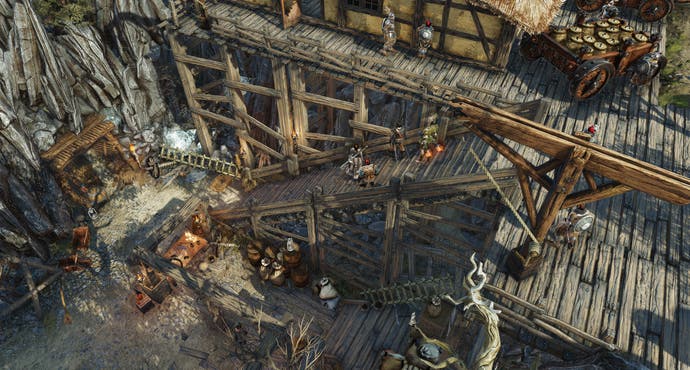
Even if not though, designing for this freedom offers plenty for everyone. Much like Dragon Age, the key theme is 'origins'. Each character in the party will have a unique one (along with a 'no origin' option if you just want a blank slate), with a jailbreak at the start of the game hooking your character up with three NPCs, and all of your stories running throughout the adventure. The island I saw was Gwynne's childhood home, meaning that she knew most people, whereas her party were arriving as strangers. The level of detail here is crazy, not just with every character reacting differently to each race and special-case character, but those characters reacting differently to everything they saw. To Gwynne for instance, a statue outside of town is described as "How this statue used to frighten me." To another human, it's "Harrald, the hero of the Northminster siege." To the dwarf, it's "Harrald the Mighty? Harrald the Maimer more like!"
Once in town, dialogue gets truly ridiculous. Along with every character having tags that offer extra dialogue options, like Swindler or Witty or Heiress, and the last game's Pet Pal skill for talking with animals, Original Sin 2 adds ghosts. Specifically, every character you kill leaves behind a ghost, and yes, they have new dialogue for party members who can talk to them, and yes, you can abuse the hell out of this. The first town features an investigation into a poisoning (for some players - the suspects won't even talk to some characters) where the victim is lying comatose. A healer might be able to do something about that. A spirit talker can shrug, murder the victim, and demand answers from their ghost. For extra bastardry, possibly on threat of eating their soul.
As impressive as all this is - and as terrifying just a mental image of the dialogue trees and scripting can be - I do have a few concerns about how this will play out. In particular, the downside of offering so many options is often that progress becomes more about choosing one than actually figuring anything out, especially when the steps and mechanics have to be both fluid and resilient enough to have Sherlock Holmes paired up with Roger The Psycho and let both of them have play in their own way. I fear for the weight of things, especially knowing that being thrown into jail or dying just means a short walk back from a respawn point. Having to rely on other party members to break you out/resurrect you has its own problems, but even in a short demo it quickly became easy to shrug off any consequences with just "Whatever."
On top of this, there's also the standard online RPG problem - it only takes one person who's already done part of the game to disrupt it for everyone. You know who I mean. The one who just magically knows that you get the hidden key here and you kill that guy, and we go there and hurry up hurry up what the hell are you doing 'savouring the journey' when there's gold!
Larian is hardly blind to any of this though, or the fact that realistically most players will be going through the game in single-player. Even with the best will in the world, it's hard to find a good team of four for a 50-plus hour adventure, especially a kind that borrows from table-top design enough that you'd want to be doing it with actual friends rather than random internet people. If you've got that, great. Even if not, it's still looking at Divinity: Original Sin 2 as its Baldur's Gate 2 - bigger, better, building on what worked and refining what didn't. That stretches from systems, allowing for more freedom and roleplaying, to the basic lore of the game. There's now a whole team devoted to that, rather than the writers just throwing everything at the wall.
The additional ideas already on show are fresh, promising, and most of all, feel like they're coming at the right time. Historically, Larian's problem has always been having cool ideas without the foundation to make them live up to the premise. With Original Sin, it laid them well and we all saw that they were good. Now it can really have some fun with them, and see how high they let it build.
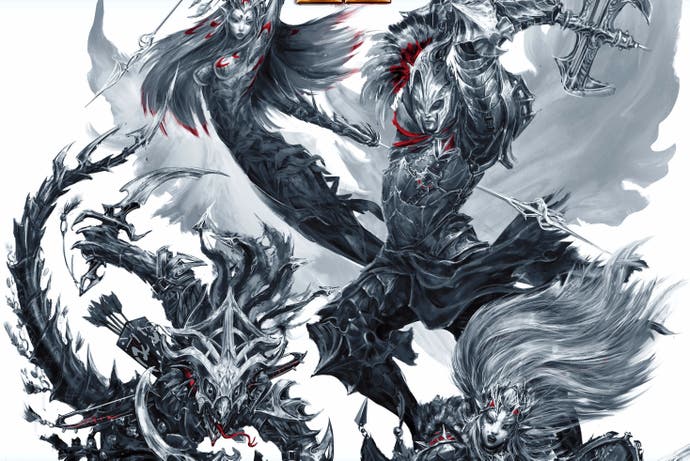

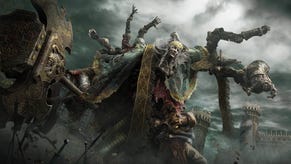
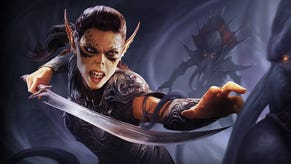

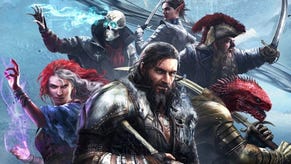
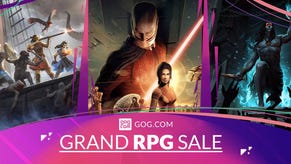
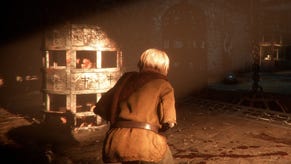
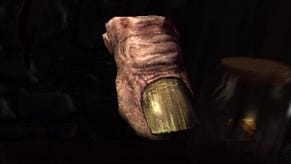
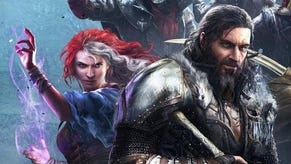



.png?width=291&height=164&fit=crop&quality=80&format=jpg&auto=webp)



